Critical Analysis of the Bush Doctrine and American Foreign Policy
VerifiedAdded on 2022/10/01
|7
|1849
|457
Essay
AI Summary
This essay provides an in-depth analysis of the Bush Doctrine, focusing on its core tenets and implications for American foreign policy. It examines the doctrine's emphasis on unilateralism, preemptive war, and the goal of promoting democracy and liberalism globally, particularly in the context of the Iraq War. The essay explores how the doctrine aimed to assert American hegemony and transform world politics, while also evaluating its successes and failures. It draws on the views of Robert Jervis and other scholars to assess the impact of the Bush Doctrine on international relations, including the war on terror and its long-term consequences. The analysis also considers criticisms of the doctrine, such as its impact on American global leadership and the challenges encountered in the Middle East. The essay concludes by evaluating the overall legacy of the Bush Doctrine and its lasting influence on American foreign policy.
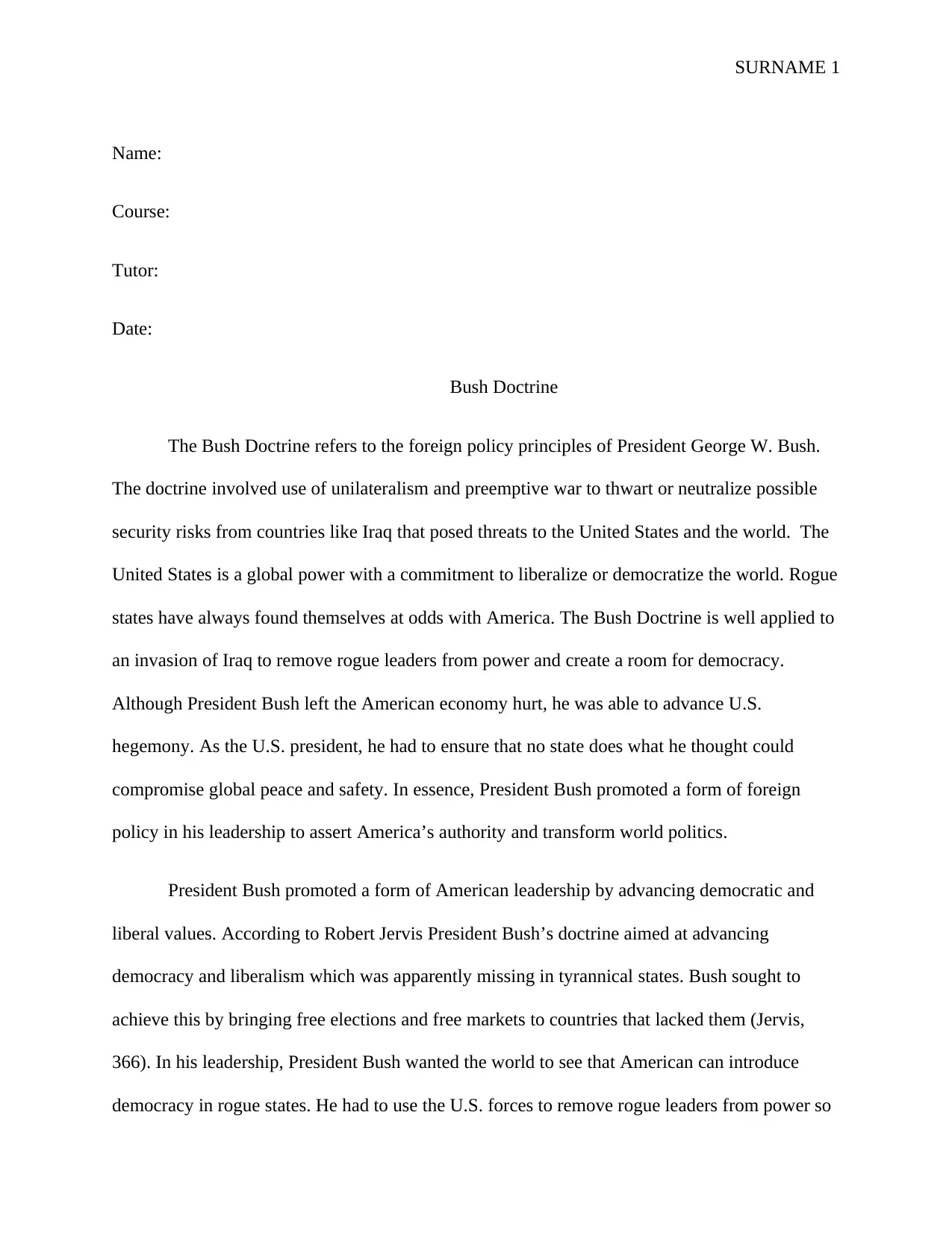
SURNAME 1
Name:
Course:
Tutor:
Date:
Bush Doctrine
The Bush Doctrine refers to the foreign policy principles of President George W. Bush.
The doctrine involved use of unilateralism and preemptive war to thwart or neutralize possible
security risks from countries like Iraq that posed threats to the United States and the world. The
United States is a global power with a commitment to liberalize or democratize the world. Rogue
states have always found themselves at odds with America. The Bush Doctrine is well applied to
an invasion of Iraq to remove rogue leaders from power and create a room for democracy.
Although President Bush left the American economy hurt, he was able to advance U.S.
hegemony. As the U.S. president, he had to ensure that no state does what he thought could
compromise global peace and safety. In essence, President Bush promoted a form of foreign
policy in his leadership to assert America’s authority and transform world politics.
President Bush promoted a form of American leadership by advancing democratic and
liberal values. According to Robert Jervis President Bush’s doctrine aimed at advancing
democracy and liberalism which was apparently missing in tyrannical states. Bush sought to
achieve this by bringing free elections and free markets to countries that lacked them (Jervis,
366). In his leadership, President Bush wanted the world to see that American can introduce
democracy in rogue states. He had to use the U.S. forces to remove rogue leaders from power so
Name:
Course:
Tutor:
Date:
Bush Doctrine
The Bush Doctrine refers to the foreign policy principles of President George W. Bush.
The doctrine involved use of unilateralism and preemptive war to thwart or neutralize possible
security risks from countries like Iraq that posed threats to the United States and the world. The
United States is a global power with a commitment to liberalize or democratize the world. Rogue
states have always found themselves at odds with America. The Bush Doctrine is well applied to
an invasion of Iraq to remove rogue leaders from power and create a room for democracy.
Although President Bush left the American economy hurt, he was able to advance U.S.
hegemony. As the U.S. president, he had to ensure that no state does what he thought could
compromise global peace and safety. In essence, President Bush promoted a form of foreign
policy in his leadership to assert America’s authority and transform world politics.
President Bush promoted a form of American leadership by advancing democratic and
liberal values. According to Robert Jervis President Bush’s doctrine aimed at advancing
democracy and liberalism which was apparently missing in tyrannical states. Bush sought to
achieve this by bringing free elections and free markets to countries that lacked them (Jervis,
366). In his leadership, President Bush wanted the world to see that American can introduce
democracy in rogue states. He had to use the U.S. forces to remove rogue leaders from power so
Paraphrase This Document
Need a fresh take? Get an instant paraphrase of this document with our AI Paraphraser
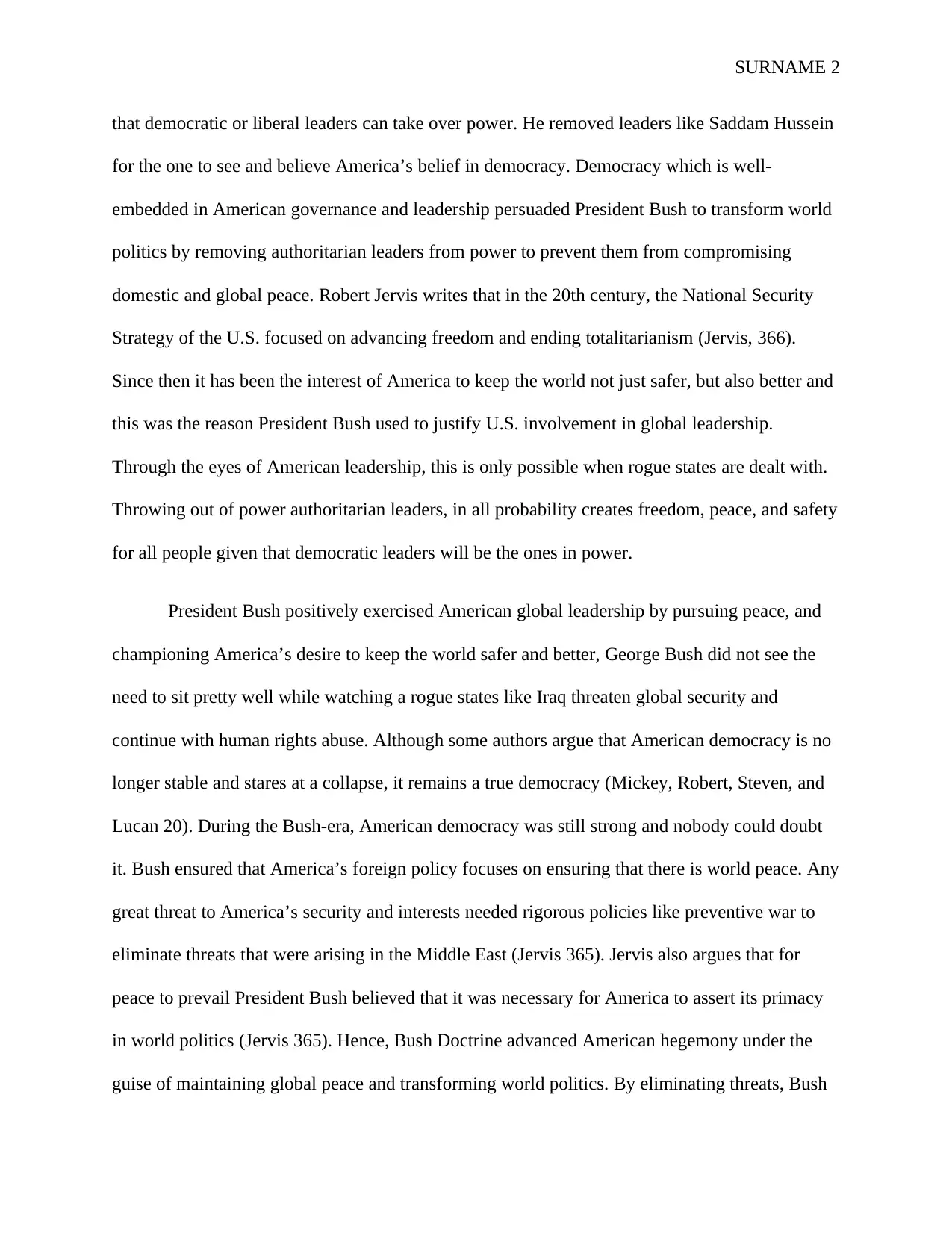
SURNAME 2
that democratic or liberal leaders can take over power. He removed leaders like Saddam Hussein
for the one to see and believe America’s belief in democracy. Democracy which is well-
embedded in American governance and leadership persuaded President Bush to transform world
politics by removing authoritarian leaders from power to prevent them from compromising
domestic and global peace. Robert Jervis writes that in the 20th century, the National Security
Strategy of the U.S. focused on advancing freedom and ending totalitarianism (Jervis, 366).
Since then it has been the interest of America to keep the world not just safer, but also better and
this was the reason President Bush used to justify U.S. involvement in global leadership.
Through the eyes of American leadership, this is only possible when rogue states are dealt with.
Throwing out of power authoritarian leaders, in all probability creates freedom, peace, and safety
for all people given that democratic leaders will be the ones in power.
President Bush positively exercised American global leadership by pursuing peace, and
championing America’s desire to keep the world safer and better, George Bush did not see the
need to sit pretty well while watching a rogue states like Iraq threaten global security and
continue with human rights abuse. Although some authors argue that American democracy is no
longer stable and stares at a collapse, it remains a true democracy (Mickey, Robert, Steven, and
Lucan 20). During the Bush-era, American democracy was still strong and nobody could doubt
it. Bush ensured that America’s foreign policy focuses on ensuring that there is world peace. Any
great threat to America’s security and interests needed rigorous policies like preventive war to
eliminate threats that were arising in the Middle East (Jervis 365). Jervis also argues that for
peace to prevail President Bush believed that it was necessary for America to assert its primacy
in world politics (Jervis 365). Hence, Bush Doctrine advanced American hegemony under the
guise of maintaining global peace and transforming world politics. By eliminating threats, Bush
that democratic or liberal leaders can take over power. He removed leaders like Saddam Hussein
for the one to see and believe America’s belief in democracy. Democracy which is well-
embedded in American governance and leadership persuaded President Bush to transform world
politics by removing authoritarian leaders from power to prevent them from compromising
domestic and global peace. Robert Jervis writes that in the 20th century, the National Security
Strategy of the U.S. focused on advancing freedom and ending totalitarianism (Jervis, 366).
Since then it has been the interest of America to keep the world not just safer, but also better and
this was the reason President Bush used to justify U.S. involvement in global leadership.
Through the eyes of American leadership, this is only possible when rogue states are dealt with.
Throwing out of power authoritarian leaders, in all probability creates freedom, peace, and safety
for all people given that democratic leaders will be the ones in power.
President Bush positively exercised American global leadership by pursuing peace, and
championing America’s desire to keep the world safer and better, George Bush did not see the
need to sit pretty well while watching a rogue states like Iraq threaten global security and
continue with human rights abuse. Although some authors argue that American democracy is no
longer stable and stares at a collapse, it remains a true democracy (Mickey, Robert, Steven, and
Lucan 20). During the Bush-era, American democracy was still strong and nobody could doubt
it. Bush ensured that America’s foreign policy focuses on ensuring that there is world peace. Any
great threat to America’s security and interests needed rigorous policies like preventive war to
eliminate threats that were arising in the Middle East (Jervis 365). Jervis also argues that for
peace to prevail President Bush believed that it was necessary for America to assert its primacy
in world politics (Jervis 365). Hence, Bush Doctrine advanced American hegemony under the
guise of maintaining global peace and transforming world politics. By eliminating threats, Bush
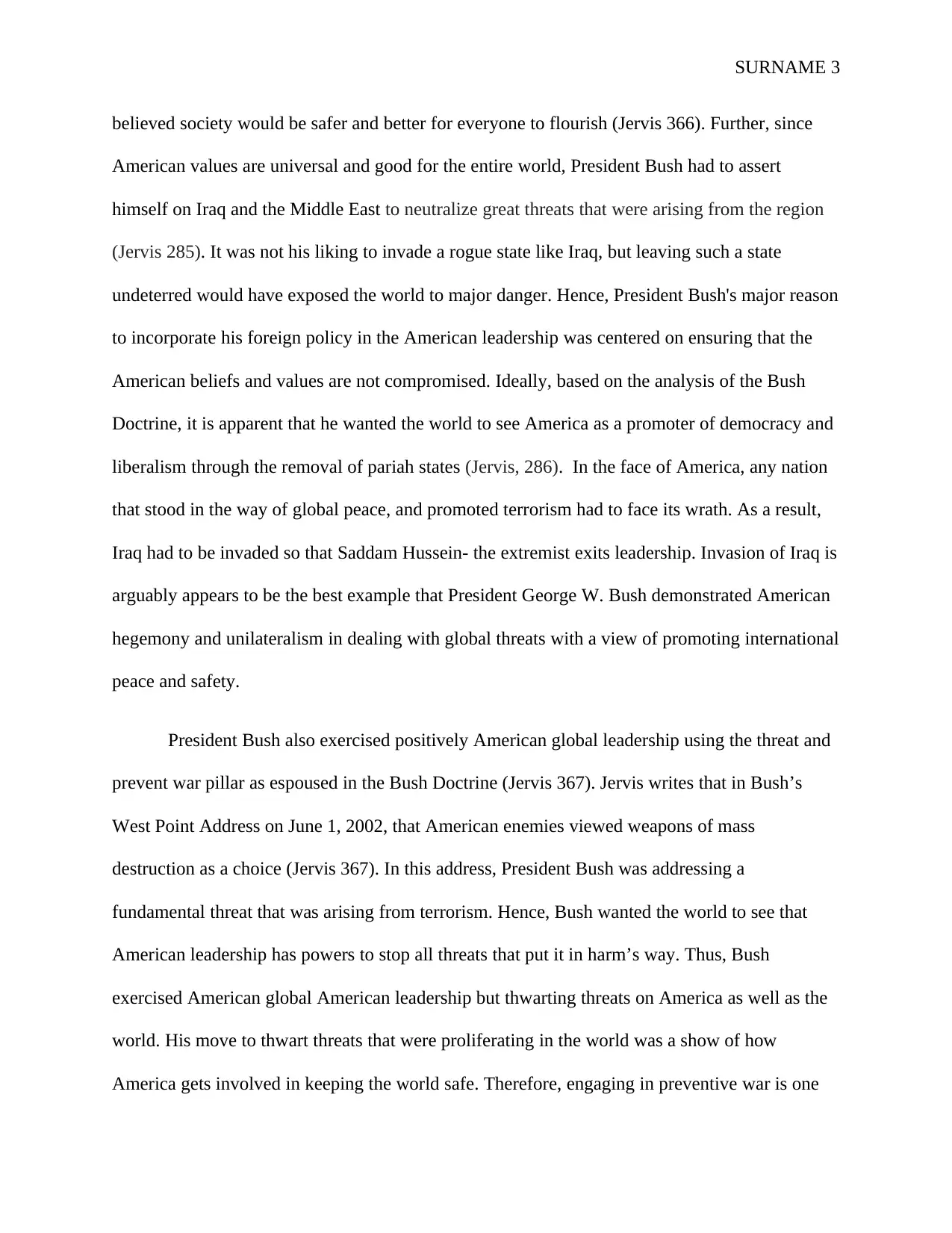
SURNAME 3
believed society would be safer and better for everyone to flourish (Jervis 366). Further, since
American values are universal and good for the entire world, President Bush had to assert
himself on Iraq and the Middle East to neutralize great threats that were arising from the region
(Jervis 285). It was not his liking to invade a rogue state like Iraq, but leaving such a state
undeterred would have exposed the world to major danger. Hence, President Bush's major reason
to incorporate his foreign policy in the American leadership was centered on ensuring that the
American beliefs and values are not compromised. Ideally, based on the analysis of the Bush
Doctrine, it is apparent that he wanted the world to see America as a promoter of democracy and
liberalism through the removal of pariah states (Jervis, 286). In the face of America, any nation
that stood in the way of global peace, and promoted terrorism had to face its wrath. As a result,
Iraq had to be invaded so that Saddam Hussein- the extremist exits leadership. Invasion of Iraq is
arguably appears to be the best example that President George W. Bush demonstrated American
hegemony and unilateralism in dealing with global threats with a view of promoting international
peace and safety.
President Bush also exercised positively American global leadership using the threat and
prevent war pillar as espoused in the Bush Doctrine (Jervis 367). Jervis writes that in Bush’s
West Point Address on June 1, 2002, that American enemies viewed weapons of mass
destruction as a choice (Jervis 367). In this address, President Bush was addressing a
fundamental threat that was arising from terrorism. Hence, Bush wanted the world to see that
American leadership has powers to stop all threats that put it in harm’s way. Thus, Bush
exercised American global American leadership but thwarting threats on America as well as the
world. His move to thwart threats that were proliferating in the world was a show of how
America gets involved in keeping the world safe. Therefore, engaging in preventive war is one
believed society would be safer and better for everyone to flourish (Jervis 366). Further, since
American values are universal and good for the entire world, President Bush had to assert
himself on Iraq and the Middle East to neutralize great threats that were arising from the region
(Jervis 285). It was not his liking to invade a rogue state like Iraq, but leaving such a state
undeterred would have exposed the world to major danger. Hence, President Bush's major reason
to incorporate his foreign policy in the American leadership was centered on ensuring that the
American beliefs and values are not compromised. Ideally, based on the analysis of the Bush
Doctrine, it is apparent that he wanted the world to see America as a promoter of democracy and
liberalism through the removal of pariah states (Jervis, 286). In the face of America, any nation
that stood in the way of global peace, and promoted terrorism had to face its wrath. As a result,
Iraq had to be invaded so that Saddam Hussein- the extremist exits leadership. Invasion of Iraq is
arguably appears to be the best example that President George W. Bush demonstrated American
hegemony and unilateralism in dealing with global threats with a view of promoting international
peace and safety.
President Bush also exercised positively American global leadership using the threat and
prevent war pillar as espoused in the Bush Doctrine (Jervis 367). Jervis writes that in Bush’s
West Point Address on June 1, 2002, that American enemies viewed weapons of mass
destruction as a choice (Jervis 367). In this address, President Bush was addressing a
fundamental threat that was arising from terrorism. Hence, Bush wanted the world to see that
American leadership has powers to stop all threats that put it in harm’s way. Thus, Bush
exercised American global American leadership but thwarting threats on America as well as the
world. His move to thwart threats that were proliferating in the world was a show of how
America gets involved in keeping the world safe. Therefore, engaging in preventive war is one
⊘ This is a preview!⊘
Do you want full access?
Subscribe today to unlock all pages.

Trusted by 1+ million students worldwide
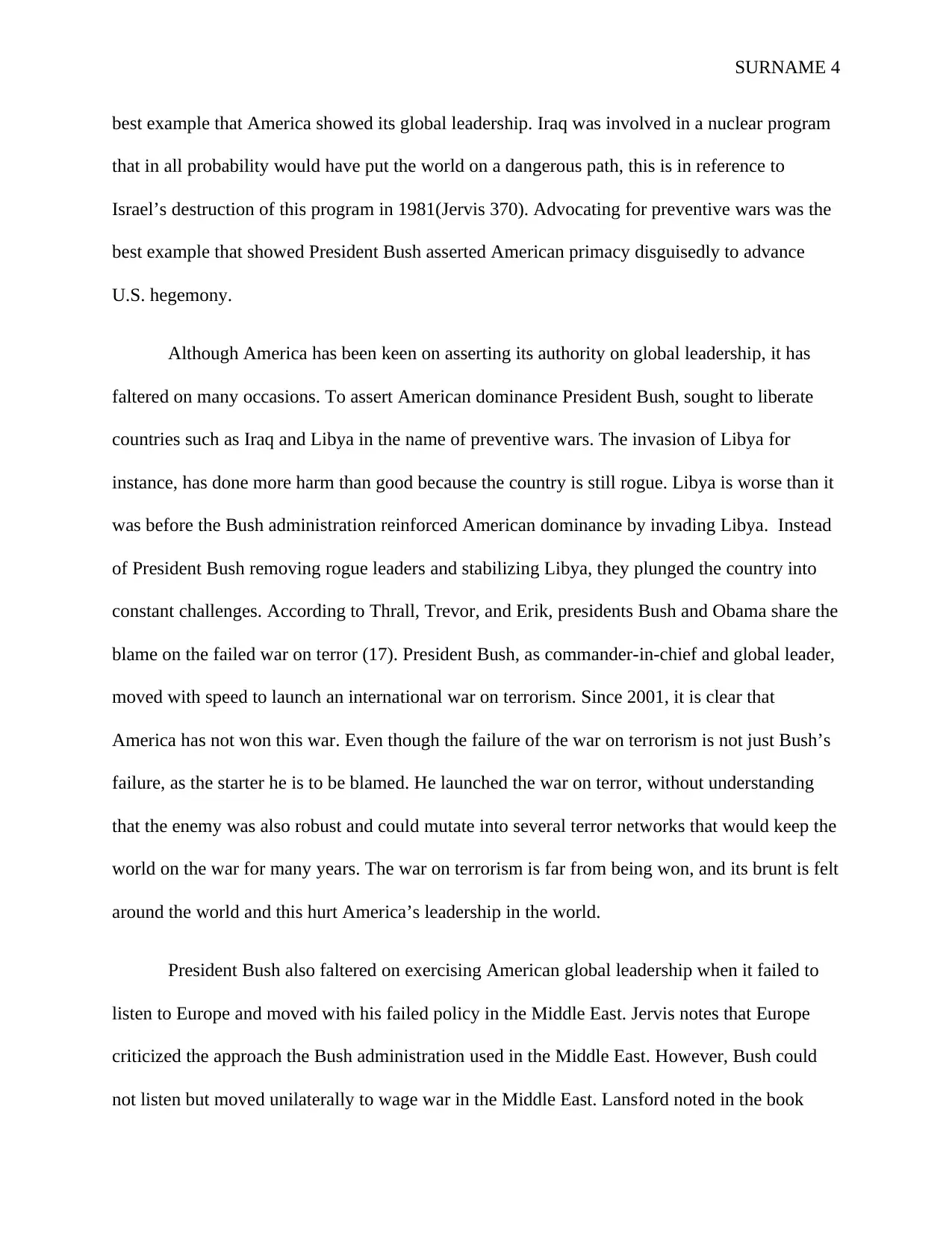
SURNAME 4
best example that America showed its global leadership. Iraq was involved in a nuclear program
that in all probability would have put the world on a dangerous path, this is in reference to
Israel’s destruction of this program in 1981(Jervis 370). Advocating for preventive wars was the
best example that showed President Bush asserted American primacy disguisedly to advance
U.S. hegemony.
Although America has been keen on asserting its authority on global leadership, it has
faltered on many occasions. To assert American dominance President Bush, sought to liberate
countries such as Iraq and Libya in the name of preventive wars. The invasion of Libya for
instance, has done more harm than good because the country is still rogue. Libya is worse than it
was before the Bush administration reinforced American dominance by invading Libya. Instead
of President Bush removing rogue leaders and stabilizing Libya, they plunged the country into
constant challenges. According to Thrall, Trevor, and Erik, presidents Bush and Obama share the
blame on the failed war on terror (17). President Bush, as commander-in-chief and global leader,
moved with speed to launch an international war on terrorism. Since 2001, it is clear that
America has not won this war. Even though the failure of the war on terrorism is not just Bush’s
failure, as the starter he is to be blamed. He launched the war on terror, without understanding
that the enemy was also robust and could mutate into several terror networks that would keep the
world on the war for many years. The war on terrorism is far from being won, and its brunt is felt
around the world and this hurt America’s leadership in the world.
President Bush also faltered on exercising American global leadership when it failed to
listen to Europe and moved with his failed policy in the Middle East. Jervis notes that Europe
criticized the approach the Bush administration used in the Middle East. However, Bush could
not listen but moved unilaterally to wage war in the Middle East. Lansford noted in the book
best example that America showed its global leadership. Iraq was involved in a nuclear program
that in all probability would have put the world on a dangerous path, this is in reference to
Israel’s destruction of this program in 1981(Jervis 370). Advocating for preventive wars was the
best example that showed President Bush asserted American primacy disguisedly to advance
U.S. hegemony.
Although America has been keen on asserting its authority on global leadership, it has
faltered on many occasions. To assert American dominance President Bush, sought to liberate
countries such as Iraq and Libya in the name of preventive wars. The invasion of Libya for
instance, has done more harm than good because the country is still rogue. Libya is worse than it
was before the Bush administration reinforced American dominance by invading Libya. Instead
of President Bush removing rogue leaders and stabilizing Libya, they plunged the country into
constant challenges. According to Thrall, Trevor, and Erik, presidents Bush and Obama share the
blame on the failed war on terror (17). President Bush, as commander-in-chief and global leader,
moved with speed to launch an international war on terrorism. Since 2001, it is clear that
America has not won this war. Even though the failure of the war on terrorism is not just Bush’s
failure, as the starter he is to be blamed. He launched the war on terror, without understanding
that the enemy was also robust and could mutate into several terror networks that would keep the
world on the war for many years. The war on terrorism is far from being won, and its brunt is felt
around the world and this hurt America’s leadership in the world.
President Bush also faltered on exercising American global leadership when it failed to
listen to Europe and moved with his failed policy in the Middle East. Jervis notes that Europe
criticized the approach the Bush administration used in the Middle East. However, Bush could
not listen but moved unilaterally to wage war in the Middle East. Lansford noted in the book
Paraphrase This Document
Need a fresh take? Get an instant paraphrase of this document with our AI Paraphraser
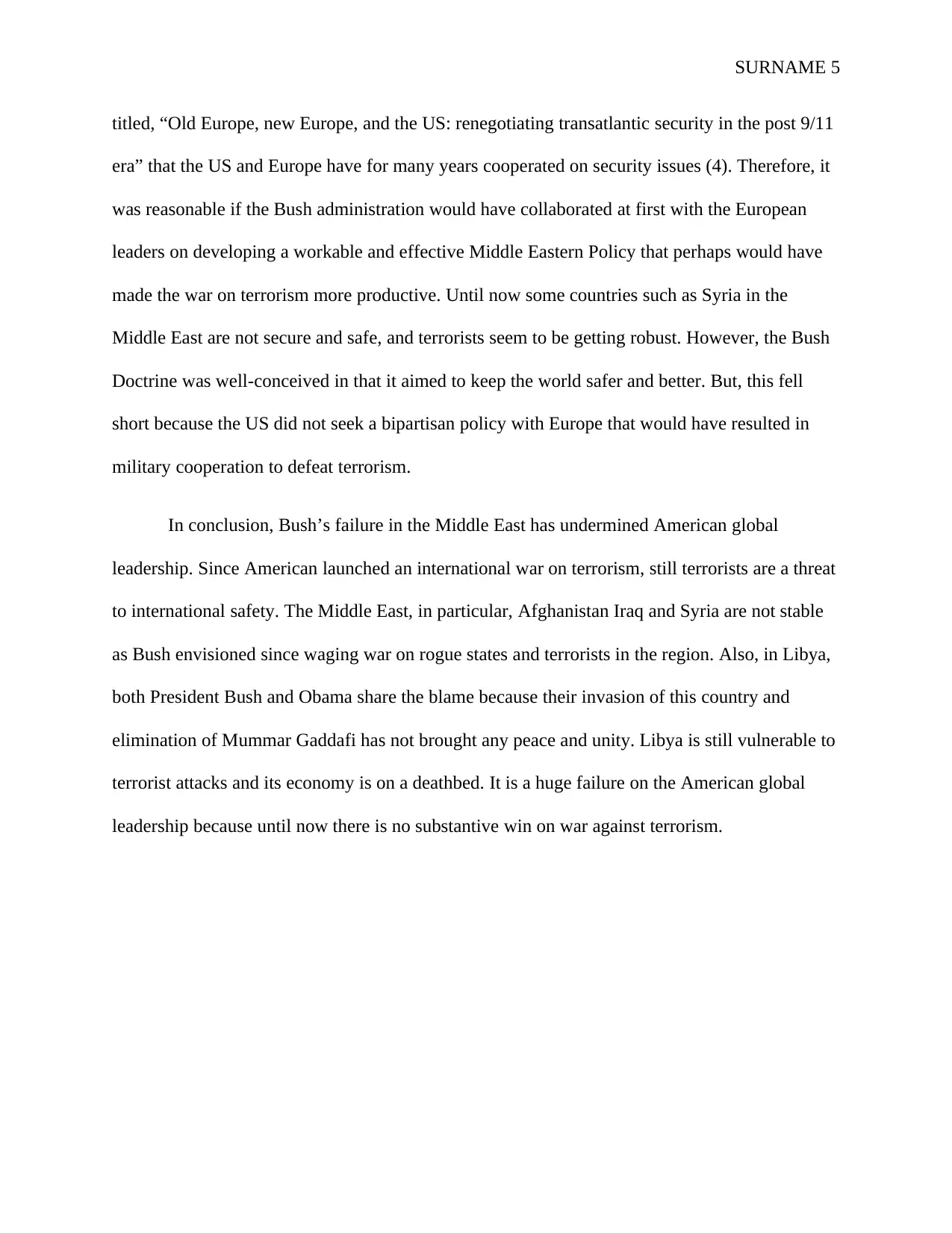
SURNAME 5
titled, “Old Europe, new Europe, and the US: renegotiating transatlantic security in the post 9/11
era” that the US and Europe have for many years cooperated on security issues (4). Therefore, it
was reasonable if the Bush administration would have collaborated at first with the European
leaders on developing a workable and effective Middle Eastern Policy that perhaps would have
made the war on terrorism more productive. Until now some countries such as Syria in the
Middle East are not secure and safe, and terrorists seem to be getting robust. However, the Bush
Doctrine was well-conceived in that it aimed to keep the world safer and better. But, this fell
short because the US did not seek a bipartisan policy with Europe that would have resulted in
military cooperation to defeat terrorism.
In conclusion, Bush’s failure in the Middle East has undermined American global
leadership. Since American launched an international war on terrorism, still terrorists are a threat
to international safety. The Middle East, in particular, Afghanistan Iraq and Syria are not stable
as Bush envisioned since waging war on rogue states and terrorists in the region. Also, in Libya,
both President Bush and Obama share the blame because their invasion of this country and
elimination of Mummar Gaddafi has not brought any peace and unity. Libya is still vulnerable to
terrorist attacks and its economy is on a deathbed. It is a huge failure on the American global
leadership because until now there is no substantive win on war against terrorism.
titled, “Old Europe, new Europe, and the US: renegotiating transatlantic security in the post 9/11
era” that the US and Europe have for many years cooperated on security issues (4). Therefore, it
was reasonable if the Bush administration would have collaborated at first with the European
leaders on developing a workable and effective Middle Eastern Policy that perhaps would have
made the war on terrorism more productive. Until now some countries such as Syria in the
Middle East are not secure and safe, and terrorists seem to be getting robust. However, the Bush
Doctrine was well-conceived in that it aimed to keep the world safer and better. But, this fell
short because the US did not seek a bipartisan policy with Europe that would have resulted in
military cooperation to defeat terrorism.
In conclusion, Bush’s failure in the Middle East has undermined American global
leadership. Since American launched an international war on terrorism, still terrorists are a threat
to international safety. The Middle East, in particular, Afghanistan Iraq and Syria are not stable
as Bush envisioned since waging war on rogue states and terrorists in the region. Also, in Libya,
both President Bush and Obama share the blame because their invasion of this country and
elimination of Mummar Gaddafi has not brought any peace and unity. Libya is still vulnerable to
terrorist attacks and its economy is on a deathbed. It is a huge failure on the American global
leadership because until now there is no substantive win on war against terrorism.
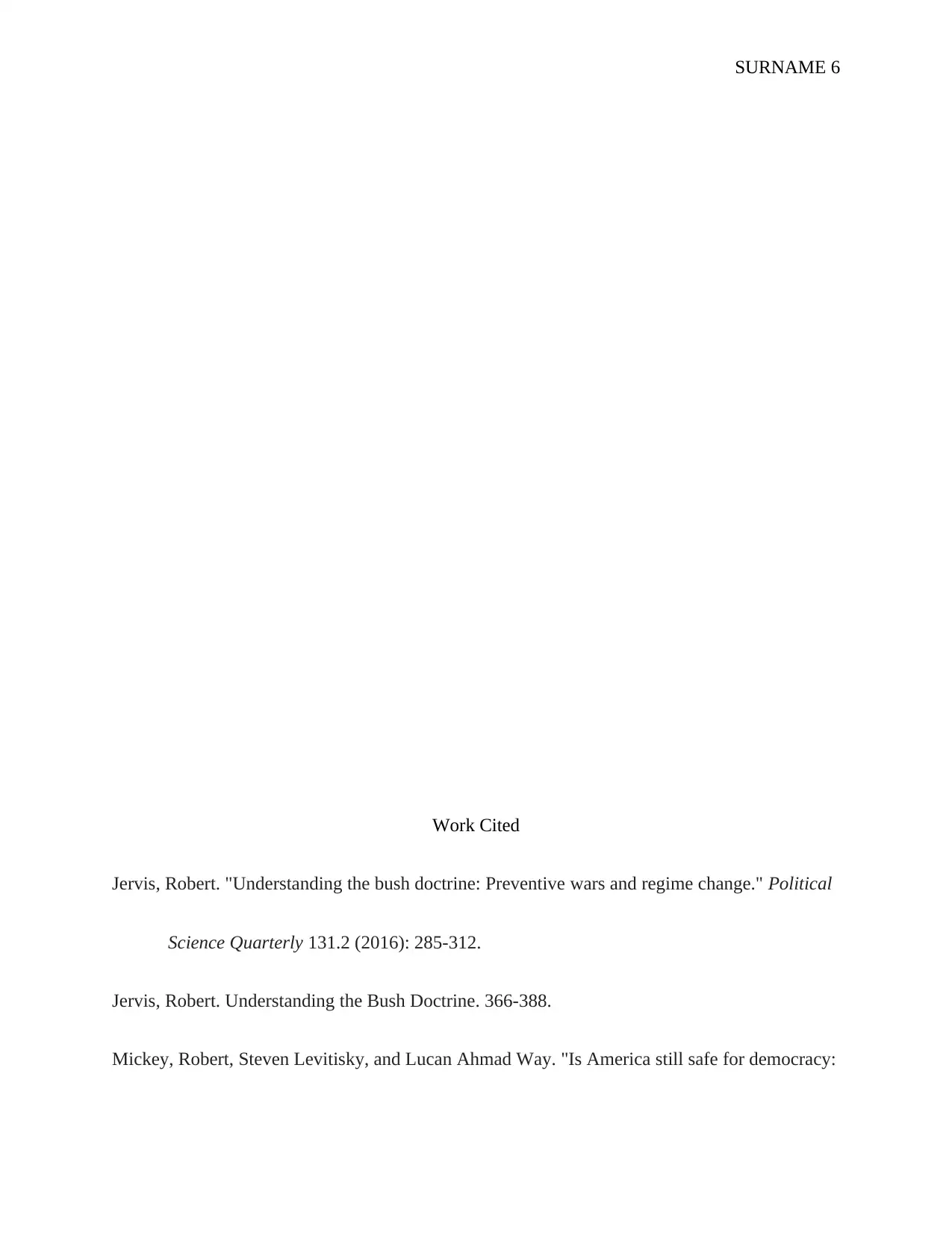
SURNAME 6
Work Cited
Jervis, Robert. "Understanding the bush doctrine: Preventive wars and regime change." Political
Science Quarterly 131.2 (2016): 285-312.
Jervis, Robert. Understanding the Bush Doctrine. 366-388.
Mickey, Robert, Steven Levitisky, and Lucan Ahmad Way. "Is America still safe for democracy:
Work Cited
Jervis, Robert. "Understanding the bush doctrine: Preventive wars and regime change." Political
Science Quarterly 131.2 (2016): 285-312.
Jervis, Robert. Understanding the Bush Doctrine. 366-388.
Mickey, Robert, Steven Levitisky, and Lucan Ahmad Way. "Is America still safe for democracy:
⊘ This is a preview!⊘
Do you want full access?
Subscribe today to unlock all pages.

Trusted by 1+ million students worldwide
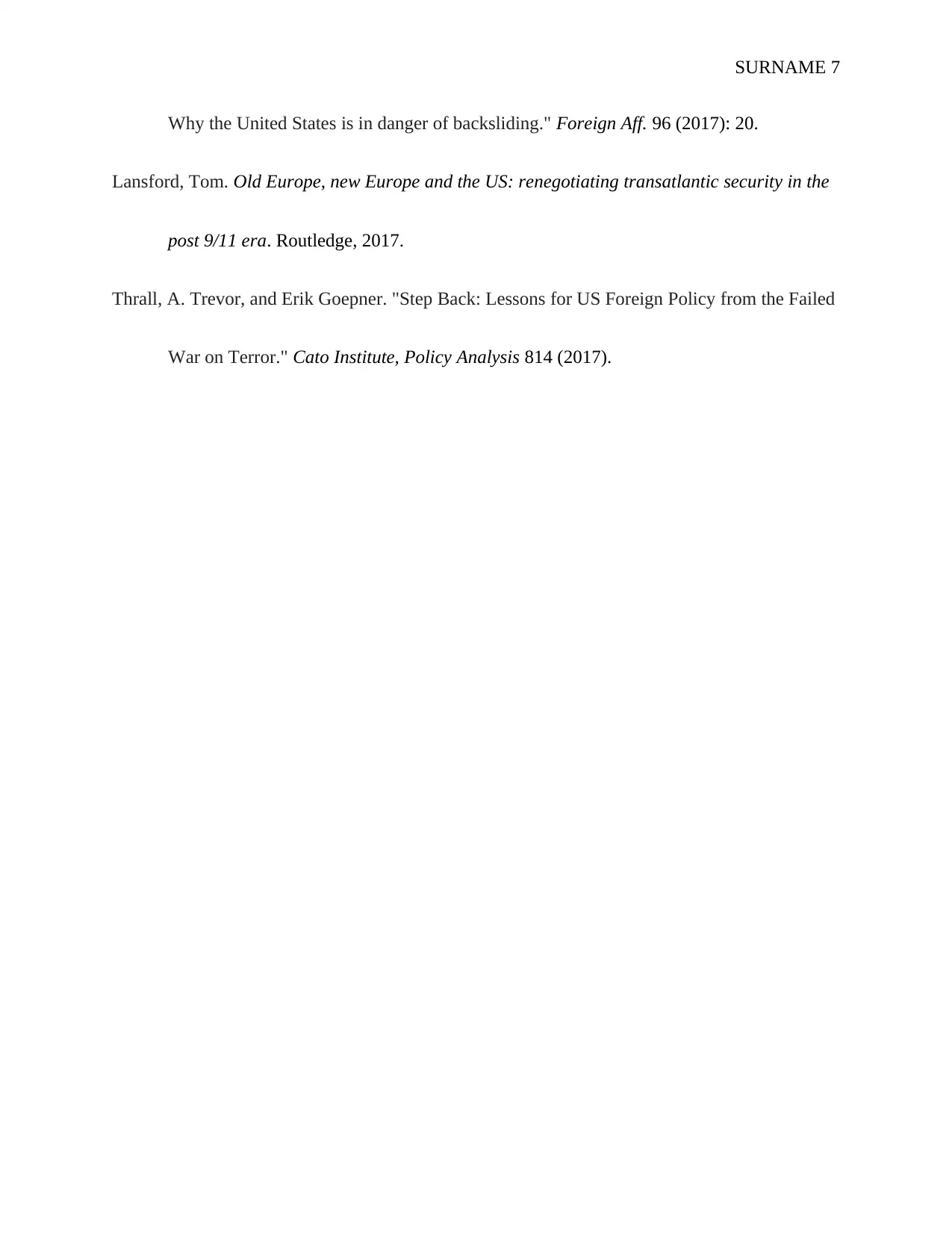
SURNAME 7
Why the United States is in danger of backsliding." Foreign Aff. 96 (2017): 20.
Lansford, Tom. Old Europe, new Europe and the US: renegotiating transatlantic security in the
post 9/11 era. Routledge, 2017.
Thrall, A. Trevor, and Erik Goepner. "Step Back: Lessons for US Foreign Policy from the Failed
War on Terror." Cato Institute, Policy Analysis 814 (2017).
Why the United States is in danger of backsliding." Foreign Aff. 96 (2017): 20.
Lansford, Tom. Old Europe, new Europe and the US: renegotiating transatlantic security in the
post 9/11 era. Routledge, 2017.
Thrall, A. Trevor, and Erik Goepner. "Step Back: Lessons for US Foreign Policy from the Failed
War on Terror." Cato Institute, Policy Analysis 814 (2017).
1 out of 7
Related Documents
Your All-in-One AI-Powered Toolkit for Academic Success.
+13062052269
info@desklib.com
Available 24*7 on WhatsApp / Email
![[object Object]](/_next/static/media/star-bottom.7253800d.svg)
Unlock your academic potential
Copyright © 2020–2026 A2Z Services. All Rights Reserved. Developed and managed by ZUCOL.





